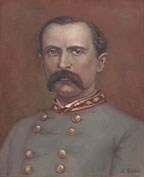Robert H. Anderson
| Robert Houstoun Anderson | |
|---|---|

Robert Houstoun Anderson
|
|
| Born |
October 1, 1835 Savannah, Georgia |
| Died | February 8, 1888 (aged 52) Savannah, Georgia |
| Place of burial | Bonaventure Cemetery, Savannah, Georgia |
| Allegiance |
|
| Service/branch |
|
| Years of service | 1857–1861 (USA) 1861–1865 (CSA) |
| Rank |
|
| Unit |
Army of Tennessee Republican Blues Georgia Hussars |
| Commands held |
Georgia Sharpshooters Fort McAllister Republican Blues Anderson's Brigade Kelly's Division |
| Battles/wars | |
| Other work | U.S. Army officer, police chief, Board of Visitors US Military Academy at West Point |
Robert Houstoun Anderson (October 1, 1835 – February 8, 1888) was an infantry officer in the United States Army then a cavalry and artillery officer in the Confederate States Army during the American Civil War. After the war he served as the Chief of the Police for the city of Savannah for 23 years, and played an important role with reunification activities at his alma mater, the United States Military Academy at West Point, New York.
Born in Savannah, Georgia on October 1, 1835, Anderson was the son of John Wayne Anderson, a local businessman. His siblings include Major George Wayne Anderson, Captain J. W. Anderson II, and Colonel C. W. Anderson. He was educated in the local schools before receiving an appointment to the United States Military Academy. "Bob" Anderson would return to West Point one day to help heal the wounds that the civil war would bring, as a member of the Board of Visitors after the war.
After graduation in 1857, as a brevet second lieutenant of infantry he was stationed in upstate New York at Fort Columbus with the 9th Infantry Division. He later served as an infantry second lieutenant at Fort Walla Walla in the Washington Territory on frontier duty from 1858-1861.
In March 1861, shortly before the official secession of his home state, Anderson left the US Army and accepted a commission as a lieutenant of artillery in the Confederate Army, formally resigning his U.S. Army commission on May 17, 1861.
...
Wikipedia
